
The second study tour of the just transition stakeholders from Ukraine in Polish mining regions
The next virtual study tour prepared by the Institute for Ecology of Industrial Areas (IETU) and the Central Mining Institute (GIG) was organised as part of the project aimed at the exchange of good practices in the area of just transition process of mining regions and energy. The project is being implemented with the support of the National Fund for Environmental Protection and Water Management and World Bank in consultation with the European Commission. Its main goal is the exchange of knowledge and good practices between coal regions in Poland and Ukraine.
The challenges the coal regions are facing now in achieving climate neutrality by 2050 require commitment and knowledge in the field of just transition process as well as involvement of a wide range of stakeholders. One of the forms of cooperation is the exchange of experiences between the mining regions of Poland and Ukraine and dissemination of the worked out solutions. These activities will facilitate the planning of the just transition process in terms of legal regulations and organisational, economic, environmental or social solutions.
The agenda of the second study tour, consisting of four on-line meetings (6 - 7 May; 11 - 12 May), was prepared by experts from IETU and GIG, in cooperation with the Ministry of Climate and Environment, Ministry of State Assets, Ministry of Funds and Regional Policy and the Marshal Office of the Silesian Voivodeship.
Over 20 people from Ukraine participated in the second virtual study tour – in that representatives of central administration, including ministries, local governments, trade unions as well as enterprises and non-governmental organisations.
The subject of the second tour focused on the strategic planning of just energy transition at the European, national, regional and local levels.
On the first day of the study tour issues connected with the preparation of the "Polish Energy Policy by 2040" were presented by Ms. Ksenia Ludwiniak from the Ministry of Climate and Environment. Actions taken by the Ministry of State Assets in the field of preparation of the just transition process in Poland were discussed by Ewa Rewakowicz. Various aspects of the financial support from European Union funds tor the just transition process of Polish regions were presented by Mr. Daniel Baliński from the Ministry of Funds and Regional Policy. The outline and specificity of the currently developed National Just Transition Plan were presented by Dr. Adam Drobniak, IETU Director, who discussed the directions of intervention at a national level, addressing such issues as: socially just transition - labour market and coal region community; effective economic transition - diversification of sectors to strengthen the employment potential and model environmental transition to a zero-emission economy that creates new jobs. Planning the transition process for the Silesian region was presented by Mr. Dariusz Stankiewicz from the Department of Regional Development at the Marshal Office of the Silesian Voivodeship.
At the next meetings, examples of projects implemented in post-mining and post-industrial areas in Bytom, Katowice and Zabrze were presented. The agenda of the visit also included a presentation of the currently implemented international research and implementation projects, in which, among others, new solutions are being developed to increase the effectiveness of the reclamation process of areas degraded by mining activities and to reduce the effects of extreme weather phenomena on mining activities.
Participants from Ukraine emphasised the importance of a dialogue with all participants of the just transition process. Attention was drawn to the necessity of preparing an economic development plan that would be consistent with the plans and activities at a local level as this would ensure new jobs and equal opportunities for miners, their families and employees in industries directly related to the mining sector. The topics connected with the development of post-mining areas and the use of the economic potential of mine waters also met with great interest.

-
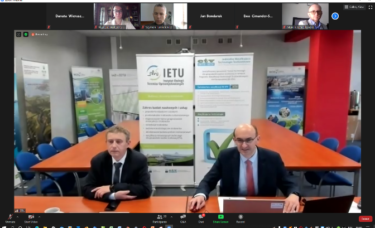
- Poland – Ukraine knowledge exchange for coal regions in transition – study tours of stakeholders from Ukraine in Polish coal regions – Second study tour, 6-7.05 and 11-12.05.2021
-
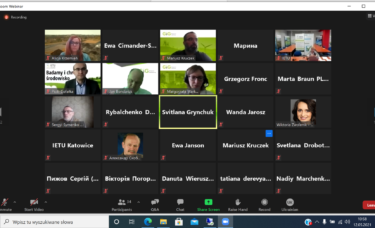
- Poland – Ukraine knowledge exchange for coal regions in transition – study tours of stakeholders from Ukraine in Polish coal regions – Second study tour, 6-7.05 and 11-12.05.2021
-
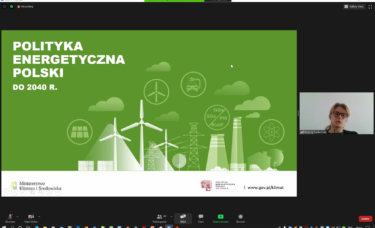
- Poland – Ukraine knowledge exchange for coal regions in transition – study tours of stakeholders from Ukraine in Polish coal regions – Second study tour, 6-7.05 and 11-12.05.2021
-

- Poland – Ukraine knowledge exchange for coal regions in transition – study tours of stakeholders from Ukraine in Polish coal regions – Second study tour, 6-7.05 and 11-12.05.2021
-

- Poland – Ukraine knowledge exchange for coal regions in transition – study tours of stakeholders from Ukraine in Polish coal regions – Second study tour, 6-7.05 and 11-12.05.2021
-
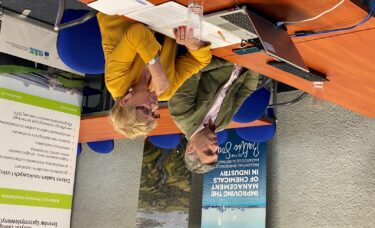
- Poland – Ukraine knowledge exchange for coal regions in transition – study tours of stakeholders from Ukraine in Polish coal regions – Second study tour, 6-7.05 and 11-12.05.2021
-

- Poland – Ukraine knowledge exchange for coal regions in transition – study tours of stakeholders from Ukraine in Polish coal regions – Second study tour, 6-7.05 and 11-12.05.2021
-
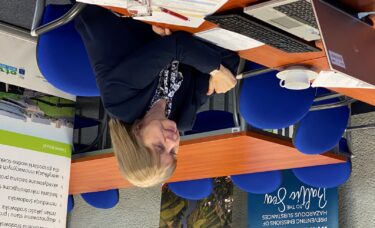
- Poland – Ukraine knowledge exchange for coal regions in transition – study tours of stakeholders from Ukraine in Polish coal regions – Second study tour, 6-7.05 and 11-12.05.2021
-

- Poland – Ukraine knowledge exchange for coal regions in transition – study tours of stakeholders from Ukraine in Polish coal regions – Second study tour, 6-7.05 and 11-12.05.2021








